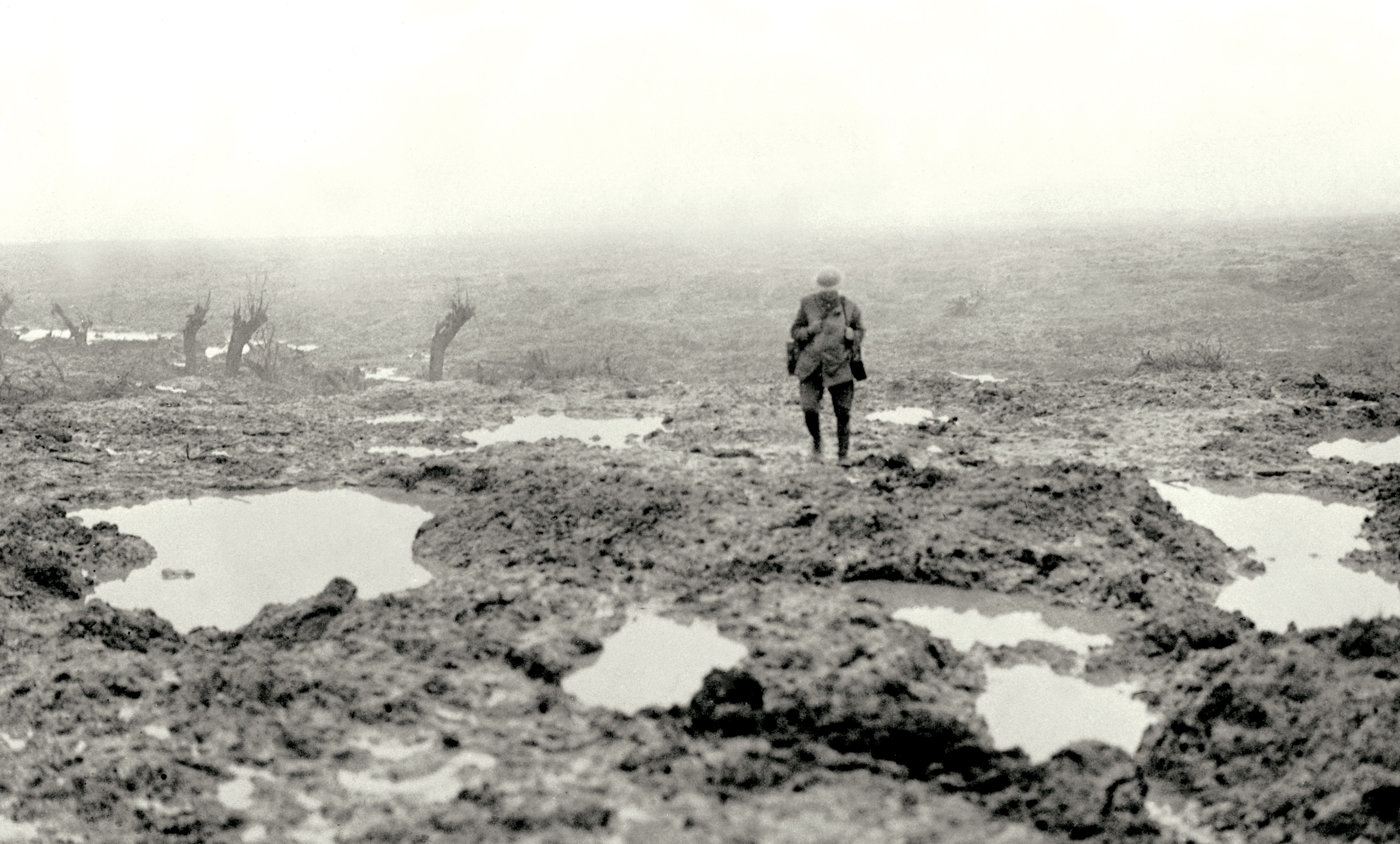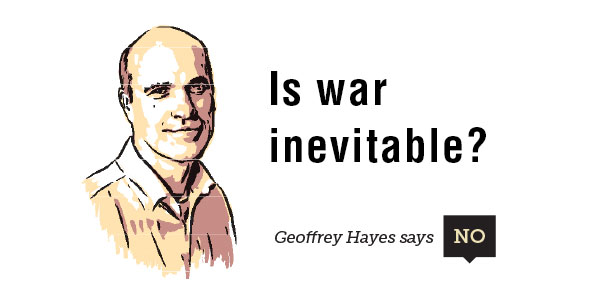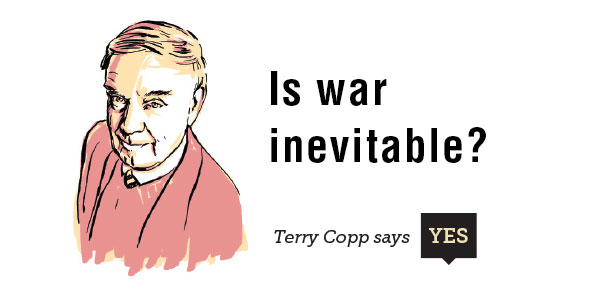
A soldier works his way across the muddy and shell-torn battlefield at Passchendaele, where wounded men disappeared beneath the slime, November 1917. [LAC – PA004564]

The word ‘inevitable’ sets me off. It suggests that wars simply happen. Wars become abstractions, beyond human control, explanation and history. That is nonsense.
A century on, the notion that the First World War was inevitable still lingers. Many children (including my own) pass their Grade 10 history classes with lofty ideas about how the war started. My own students remember the acronym they spewed out for the exam. MAIN was the culprit: Militarism; Alliances; Imperialism; Nationalism. Such ‘isms’ suggest no single cause; the responsibility for the war had to be shared. Long-term forces were to blame.
These ideas have a history. They emerged in strength after 1919, partly in response to Article 231 of the Treaty of Versailles, which legally compelled Germany to pay reparations for the war. Also known as the War Guilt Clause, it placed responsibility for the war at the feet of Germany and its allies. As early as 1914, German officials had begun compiling a selective body of documents to show that they were not to blame for the war’s outbreak. That disinformation campaign increased after 1919 to divert blame from the German generals.
Such revisionism found fertile soil beyond Germany. In January 1918, United States president Woodrow Wilson opened his Fourteen Points speech to Congress with a plea for “open covenants of peace.” He gave voice to the notion that secret diplomacy and undisclosed alliances had caused the war.
American isolationist politicians later concluded that profits made by the arms industry—“the merchants of death”—were proof of how militarism had pushed the U.S. into the war. The political left found comfort in how the war vindicated Marxist theory, which says imperialism leads to war: Germany and Great Britain building their navies to secure their empires is evidence of this.
What of nationalism? Surely, Germany’s victory over France in 1870 and its claim to Alsace and Lorraine in 1871 were enough to upset the balance of power and provoke a wider war. Those looking for easy answers—or scapegoats—concluded that the Great War, and war in general, was somehow inevitable.
Except it was not. Militarism was on the rise, but not all military staffs and arms dealers wanted war. Alliances could be broken too. Italy switched sides when it entered the war. Imperialism had produced rivalries, but the British/German naval race was over well before 1914. Remember too that the main imperial rivals, the French and the British, were allies. And despite what had happened in 1870, the French and Germans had got on fairly well for 44 years. So, what of nationalism?
Why did the war start in 1914? After a Serbian nationalist shot Austrian Archduke Franz Ferdinand in Sarajevo in June 1914, Austria-Hungary appealed to Germany to support actions against Serbia. The Germans agreed, and then chose to execute the Schlieffen Plan. It remains history’s worst mobilization scheme, for it dispatched German forces west through neutral Belgium to invade France. Neither country had anything to do with what had happened in Sarajevo. The First World War began when people in Vienna and Berlin made very bad choices. It was not inevitable. Neither is war.

While specific wars are not inevitable, war—the use of organized force to resist aggression or unbearable tyranny—will always be with us.
The First World War was far from inevitable. A cautionary word from Berlin to Vienna, instead of a blank cheque encouraging Austrian aggression, would have prevented the conflict, at least for 1914.
If Czarist Russia had accepted the conquest of Serbia by Austria-Hungary, a Europe-wide war would have been avoided. Once Germany’s plans to change the balance of power by military action were underway, Belgium and France were forced to choose between occupation and resistance. Britain, and thus Canada, could have chosen neutrality and watched as Kaiser Wilhelm’s dreams of a wide-ranging empire, including much of Europe, were realized. But the defeat of France and the occupation of the Belgian coast were too high a price to pay.
The events set in motion by the Great War led to the Russian Revolution, the reshaping of the Middle East, the first movements promoting decolonization, and the sense of victimhood that propelled Germany toward Hitler and a second war of conquest.
The policy of appeasement—the avoidance of war in the face of aggression—sacrificed Ethiopia, Republican Spain and Czechoslovakia, but by 1939 a major war could not be avoided.
We sometimes think of the period of the Cold War as a time of relative stability in international relations, as if Korea, Vietnam and numerous other small wars really did not matter. When the Cold War “ended” in 1989, there was widespread hope that a world without war might be possible.
“The End of History,” a 1989 essay by American political scientist Francis Fukuyama, was one of many attempts to predict a future free of ideological clashes, and thus free of the need for war. Fukuyama thought conflict might still occur in places still “stuck in history,” but the problem for the developed world, he feared, was that centuries of peace might bring “centuries of boredom…and serve to get history started again.”
Boredom due to a long period of peace turns out to be a pipe dream. The invasion of Kuwait and the Gulf War and civil wars in Afghanistan, Algeria, Rwanda, Sierra Leone, Somalia and Syria have killed thousands and fuelled armaments sales. After 9/11 and the invasion of Iraq, things got worse.
The decision to invade Iraq demonstrated that a great power was prepared to wage war as an instrument of domestic and foreign policy. This has been followed by Russia’s intervention in Crimea and China’s expansion in the South Pacific.
We have learned that starting a war is easy but ending it is very difficult, unless one side achieves total victory. Such wars are rare and, in the nuclear age, unlikely. So, we have to learn how to limit war, encourage negotiation and help warring parties compromise.
Canada could contribute more to this by re-establishing the Pearson Peacekeeping Centre and revisiting its whole-of-government approach to international crises. Inevitable or not, we have to keep trying to prevent war.
Advertisement





















